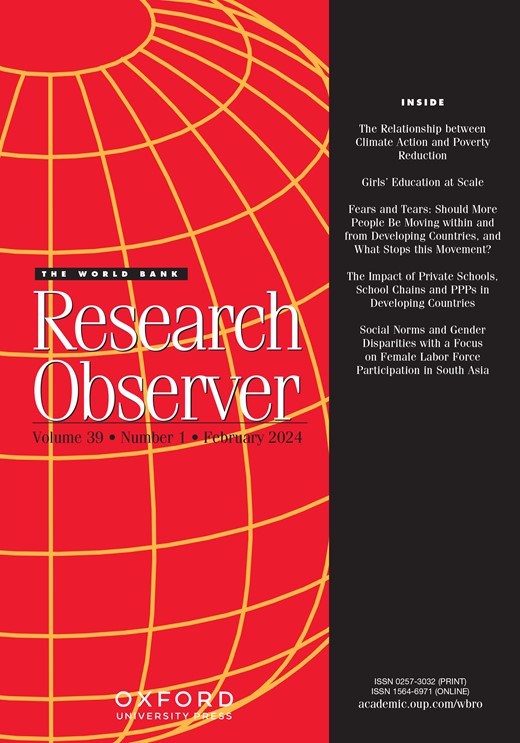人口、贫困和气候变化
IF 3.3
1区 经济学
Q1 DEVELOPMENT STUDIES
引用次数: 36
摘要
本文对人口、贫困和气候变化之间的关系进行了综述。虽然发达国家对全球变暖负有主要责任,但发展中国家将首当其冲地承担其后果,农业产量下降,健康状况恶化,自然灾害更加频繁。发达国家的碳排放量已趋于平稳,但由于发展中国家的经济增长和人口增长——后者在最贫穷的国家最为明显,预计发展中国家的碳排放量将迅速上升。降低生育率对最贫穷的国家有很多好处。研究表明,在高生育率环境中,生育率下降有助于经济增长和减贫。它还减少了生计的压力,并释放了应对气候变化的资源。它还有助于避免一些预计的全球变暖,这将使这些国家比那些纬度较高和/或有更多资源应对气候变化的国家受益更多。自然实验表明,计划生育方案在帮助降低生育率方面是有效的,而且它们的影响对穷人非常有利。当世界其他地区还在为复杂的减排问题苦苦挣扎时,最贫穷的国家将从降低生育率的简单项目中获益良多。本文章由计算机程序翻译,如有差异,请以英文原文为准。
Population, Poverty, and Climate Change
The literature is reviewed on the relationships between population, poverty, and climate change. While developed countries are largely responsible for global warming, the brunt of the fallout will be borne by the developing world, in lower agricultural output, poorer health, and more frequent natural disasters. Carbon emissions in the developed world have leveled off, but are projected to rise rapidly in the developing world due to their economic growth and population growth -- the latter most notably in the poorest countries. Lowering fertility has many benefits for the poorest countries. Studies indicate that, in high fertility settings, fertility decline facilitates economic growth and poverty reduction. It also reduces the pressure on livelihoods, and frees up resources to cope with climate change. And it helps avert some of the projected global warming, which will benefit these countries far more than those that lie at higher latitudes and/or have more resources to cope with climate change. Natural experiments indicate that family planning programs are effective in helping reduce fertility, and that they are highly pro-poor in their impact. While the rest of the world wrestles with the complexities of reducing emissions, the poorest countries will gain much from simple programs to lower fertility.
求助全文
通过发布文献求助,成功后即可免费获取论文全文。
去求助
来源期刊

World Bank Research Observer
Multiple-
CiteScore
12.60
自引率
1.20%
发文量
8
期刊介绍:
The World Bank Journals, including the Research Observer, boast the largest circulation among economics titles. The Research Observer is distributed freely to over 9,100 subscribers in non-OECD countries. Geared towards informing nonspecialist readers about research within and outside the Bank, it covers areas of economics relevant for development policy. Intended for policymakers, project officers, journalists, and educators, its surveys and overviews require only minimal background in economic analysis. Articles are not sent to referees but are assessed and approved by the Editorial Board, including distinguished economists from outside the Bank. The Observer has around 1,500 subscribers in OECD countries and nearly 10,000 subscribers in developing countries.
 求助内容:
求助内容: 应助结果提醒方式:
应助结果提醒方式:


